Foreign News
Iran Parliament Vote To Block Main Oil Route, Hormuz Shipping Channel!
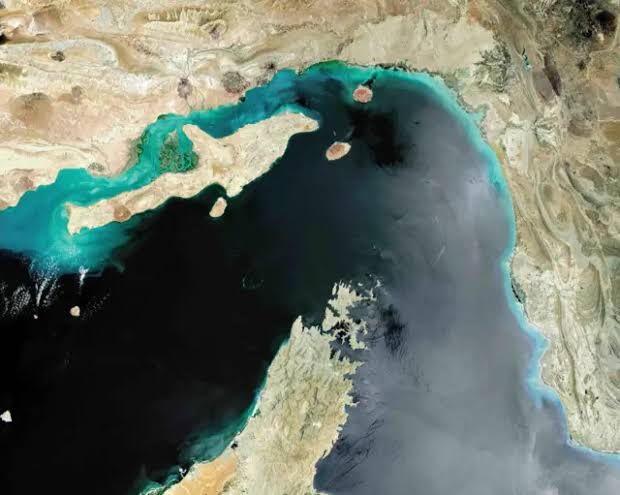
In response to Donald Trump’s attack on Iran, the Iranian parliament voted to close the crucial Hormuz shipping channel,
raising concerns that a sudden spike in oil prices could trigger a worldwide recession.
After rising more than 10% since mid-June, when Israel’s attack on Iranian nuclear sites prompted missile strikes from Tehran against Tel Aviv, a barrel of Brent crude was trading at roughly $77 on Friday.
However, Trump’s choice to follow Israel by attacking Iran with has sparked a series of events
that experts caution could push prices higher when markets open on Sunday at 11 p.m. UK time.
The strait of Hormuz, a gateway out of the Persian Gulf, is where a fifth of the world’s oil consumption passes.
Since Iran’s supreme national security council has the final say, the vote, as reported by Reuters, is not legally binding.
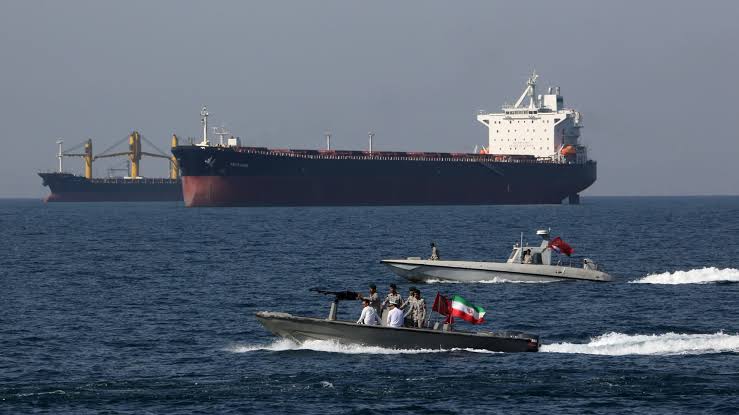
Also Read:
Iran Promises Retaliation After U.S. Bombed It’s Nuclear Sites
5.1 Magnitude Earthquake Hits Iran Amidst War With Israel
Petrol Prices On The Increase As Iran And Israel Clash Continues!
But even before the outcome of the vote was known, analysts were forecasting a $5 spike.
What Will Happen If Iran Successfully Closes The Hormuz Channel?
“An oil price jump is expected,” said Jorge León, the head of geopolitical analysis at the energy intelligence firm Rystad and a former official at Opec, the group of major oil-producing nations.
“In an extreme scenario where Iran responds with direct strikes or targets regional oil infrastructure, oil prices will surge sharply.
Even in the absence of immediate retaliation, markets are likely to price in a higher geopolitical risk premium.”
Meanwhile, Brent crude, the traditional benchmark global oil price, could gain $3 to $5 a barrel when markets open, Ole Hvalbye, an SEB analyst, said in a note.
JP Morgan has also previously forecast that the oil price could rise as high as $130
in the event that a sustained Middle East conflict closes the strait of Hormuz for an extended period.
Furthermore, recall that Iranian officials have said they would block the strait if Tehran’s interests were threatened.
A prolonged closure could have huge knock-on effects for the global economy.
An oil price shock would risk a period of high inflation,
as motorists pay more for petrol and the cost of transporting goods soars.
Meanwhile there have been several calls from both US and UK to China, asking that the country intervenes against closing the Hormuz

Foreign News
All Living Israeli Hostages Freed as Gaza Ceasefire Enters Historic Phase

In a significant milestone toward ending months of violence, all 20 remaining living Israeli hostages held by Hamas in Gaza were released today October 13th under a newly brokered ceasefire agreement.
The development marks a historic turning point in the prolonged Gaza–Israel conflict,
drawing mixed emotions of relief, grief, and cautious optimism across the region.
Under the terms of the deal, Israel also freed over 1,900 Palestinian prisoners and detainees,
many of whom were held without trial under administrative detention.
The exchange, mediated by the United States, Egypt, and Qatar, represents one of the most substantial prisoner-swap agreements in the conflict’s history.
Families of freed hostages gathered at Tel Aviv’s Hostages Square,
embracing their loved ones with tears and celebration after months of uncertainty and anguish.
The operation, coordinated under “Operation Shavim Legvulam,” included high-security convoys and medical teams
who immediately attended to the released individuals upon their arrival in Israel.

All Living Israeli Hostages Freed as Gaza Ceasefire Enters Historic Phase
Preliminary reports also indicate that several hostages are in fragile physical and psychological condition after enduring nearly a year in captivity.
Israeli Prime Minister Benjamin Netanyahu described the releases as a “victory for perseverance and faith,”
but urged continued vigilance, warning that “peace must be guarded as carefully as it is earned.”
Meanwhile, In Gaza, the atmosphere was one of cautious relief as thousands welcomed returning prisoners.
The ceasefire terms include a phased Israeli troop withdrawal from major parts of the enclave
and also the reopening of humanitarian corridors to allow food, fuel, and medical supplies into the territory.
International aid agencies have already begun mobilising convoys for immediate relief operations.
Despite the widespread jubilation, analysts warn that the road ahead remains uncertain.
Disarmament talks, the reconstruction of Gaza, and the question of Hamas’s political future continue to divide negotiators.
However, the current truce has sparked renewed hope that a broader framework for peace could finally be within reach after years of bloodshed.
Foreign News
Russia Goes Heavy On Air Strike Against Ukraine As War Continues!
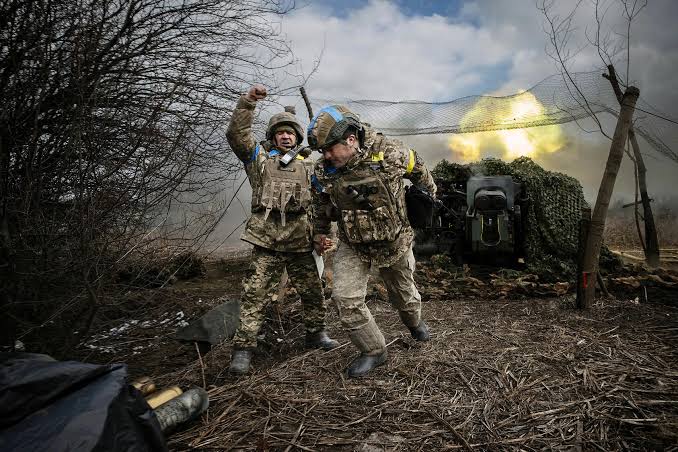
Just hours after a crucial phone conversation between Russia President Vladimir Putin and U.S. President Donald Trump on Ukraine attack ended without any progress on ending the war,
Russia unleashed its largest drone and missile attack on Ukraine overnight on Friday, July 4.
As air defence systems battled through the night to fend off the onslaught, explosions reverberated throughout Kyiv.
Furthermore as Ukrainian soldiers fought incoming threats,
AFP journalists in the city reported hearing the thunder of detonations and the continuous hum of drones.

Also Read:
Russia Threatens World War III After Trump Criticized Putin
Israel-Iran Conflict: President Trump Says US May Step In As War Escalates!
Trump Warns Putin: “You’ve Gone Absolutey Crazy!”
According to Ukrainian President Volodymyr Zelensky,
as soon as the Trump-Putin call was announced, air raid sirens started to sound throughout the nation.
“Yet again, Russia is showing it has no intention of ending the war and terror,” Zelensky said on social media.
“All of this is clear evidence that without truly large-scale pressure, Russia will not change its dumb, destructive behaviour,” he added, urging the United States to intensify pressure on Moscow.
Russia Intensifies Attacks On Ukraine With Air Strikes
According to Ukraine’s air force, the assault involved 539 drones of various types and 11 missiles.
Twenty-three people were wounded in the attack, which Ukrainian officials described as the most massive aerial assault since Russia’s full-scale invasion began.
“This was the largest attack of the war,” a Ukrainian air force spokesperson told local media.
Meanwhile, the military goals of the Kremlin were intensified.
The sixth meeting between Trump and Putin since Trump’s return to office in January ended without any diplomatic progress.
Although Trump has previously expressed optimism on potential peace agreements, his tone drastically changed during this most recent exchange.
International calls to cease the violence have been met with plain disrespect by Russia, according to Ukrainian Foreign Minister Andriy Sybiga.
He also claimed that Putin’s actions “clearly demonstrate his complete disregard for the United States and everyone who has called for an end to the war.”
Meanwhile Russia’s air campaign has become more intense in recent weeks.
The apparent breakdown of direct peace attempts coincided with a record number of drone and missile strikes against Ukraine in June, according to an AFP analysis.
Foreign News
President Donald Trump Blows Hot After Israel Violates Ceasefire Deal With Iran!
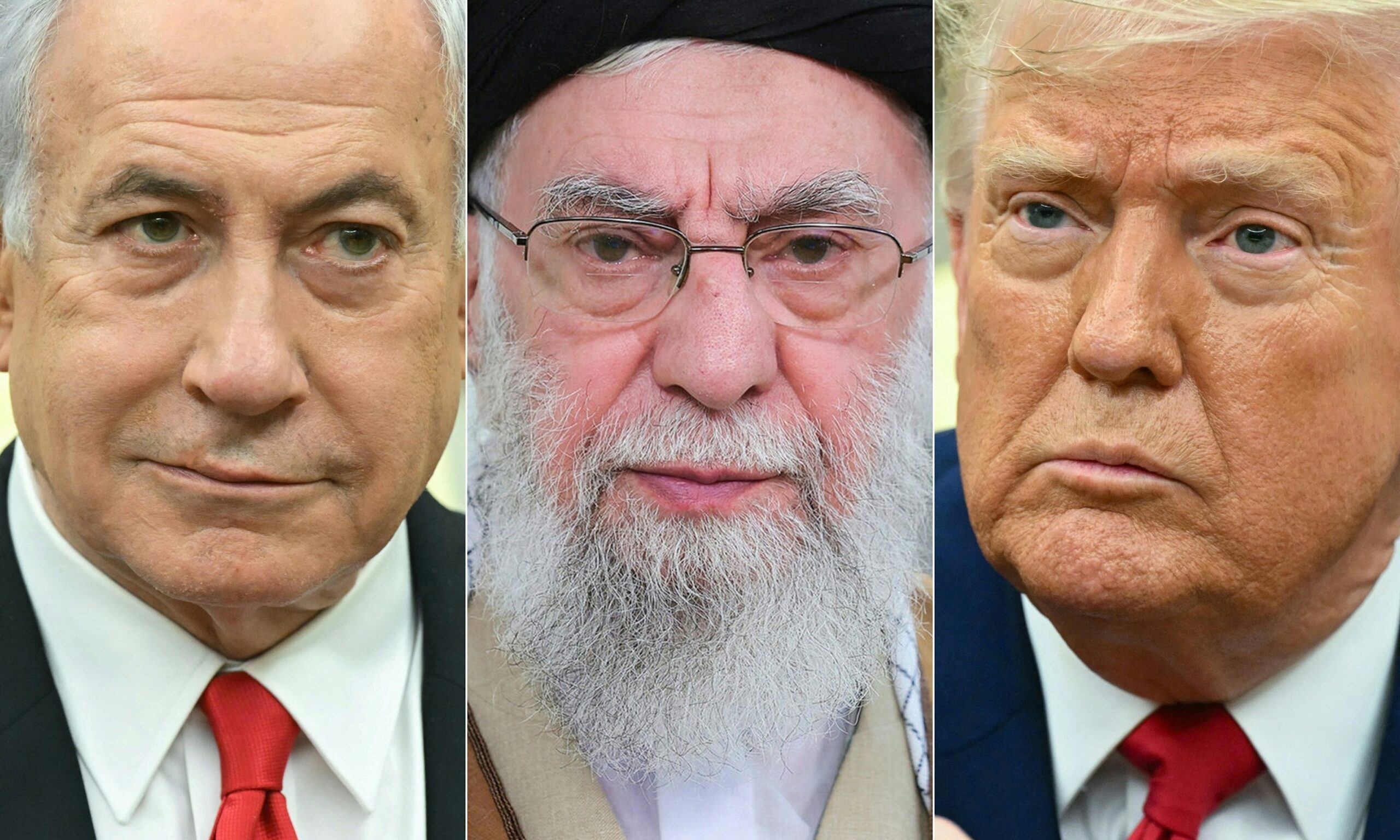
US President, Donald Trump has communicated his displeasure, with not so nice words as barely 24hrs after announcing the cease fire deal between Iran and Israel, it was violated.
The president was particularly frustrated with the Nation Israel, who were the first to violate the Ceasefire deal
Speaking to reporters at the White House, Trump appeared visibly angry and used unusually blunt language to describe the situation.
“The two countries have been fighting so long and so hard that they don’t know what the fuck they’re doing, do you understand that?” he said, referring to Iran and Israel.
“I’m really unhappy with Israel,” he added, criticizing its actions following what was intended to be a de-escalation deal.

Watch the Video HERE
Despite Trump’s declaration on Monday that a ceasefire between Iran and Israel had been reached, tensions quickly increased over night.
After Iranian forces allegedly fired two missiles into Israeli territory on Tuesday morning, Israel’s defense minister accused Iran of violating the agreement,
which further changed the course of events.
Ceasefire Deal Out Of The Window? What this Means for Israel and Iran
Israel then responded by vowing retaliation and threatening “intense” strikes against Tehrani regime targets.
Furthermore the ceasefire’s implementation and timeline were unclear.
Despite Trump’s early Tuesday declaration that the truce had “taken effect,”
fighting went on as Israeli and Iranian forces exchanged strikes in the early hours of the day, killing five Israelis and nine Iranians.
Iran’s Foreign Minister Abbas Araghchi suggested on social media that his country would halt its military response only if Israel ceased its “illegal aggression.”
He also added that Iran’s final decision on ending military operations would be determined later,
casting further doubt on the durability of the truce.
The White House, which had hoped the ceasefire would reduce tensions between the two longtime enemies, faces a serious challenge
as the flare-up represents yet another setback for diplomatic efforts in the Middle East.
The ceasefire deal was in jeopardy as the brief lull was replaced by new violence.
Foreign News
Oil Prices Drop By 5% As Israel And Iran Cease Fire!
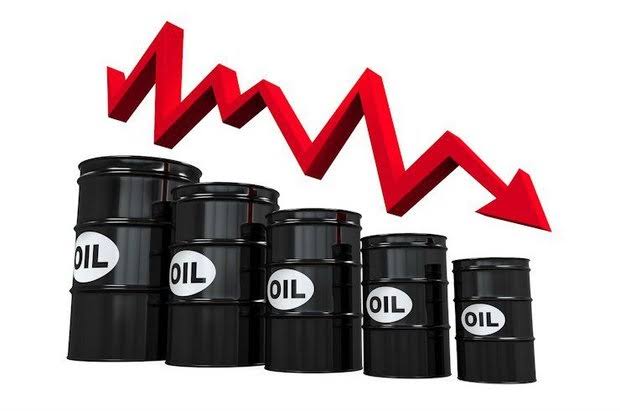
On Tuesday, June 24, after Israel announced that it had accepted a bilateral ceasefire proposal proposed by U.S. President Donald Trump, potentially ending nearly two weeks of intensifying conflict with Iran, global oil prices fell more than 5%.
As investor concerns about a protracted disruption in the energy market started to subside, crude oil saw a precipitous drop. The war had sparked worries about disruptions to the oil supply, especially through the vital Strait of Hormuz, which serves as a chokepoint for the world’s energy transportation.
The U.S. benchmark West Texas Intermediate (WTI) fell 5.4% to $65.01 per barrel by 06:50 GMT, while Brent crude had dropped 5.2% to $67.75 per barrel.

Also Read:
President Trump Announces Complete Ceasefire In The Israel-Iran War!
Iran Parliament Vote To Block Main Oil Route, Hormuz Shipping Channel!
Petrol Prices On The Increase As Iran And Israel Clash Continues!
“The potential end to the conflict has been welcomed by market participants,” said Lee Hardman, currency analyst at MUFG. “Brent has now almost fully reversed all of the gains since the conflict began.”
Global Oil Price Crashes As Iran-Israel Cease Fire Deal Begins!
The U.S. dollar declined following recent strength driven by geopolitical risk, reflecting the easing tension in currency markets as well. Hardman continued, “We’re likely to see the dollar’s weakening trend resume if Middle East tensions now fade as a driver.”
Fears that Iran might block or disrupt traffic in the Strait of Hormuz in retaliation for a U.S. strike on its nuclear facilities caused oil prices to briefly rise on Monday morning. However, when Iran’s response—a missile strike on a U.S. base in Qatar—left oil infrastructure unaffected, prices fell as much as 7% later in the day.
“Tehran played it cool,” said Stephen Innes, managing partner at SPI Asset Management. “Their retaliation was loud enough for headlines, but quiet enough not to shake the foundations of the oil market. Once that became clear, the war premium came crashing out of crude.”
Market Snapshot as at 07:00 GMT
Brent Crude: $67.75 per barrel (↓ 5.2%)
WTI Crude: $65.01 per barrel (↓ 5.4%)
Euro/Dollar: $1.1609 (↑)
Pound/Dollar: $1.3586 (↑)
Dollar/Yen: 145.05 yen (↓)
Tokyo – Nikkei 225: 38,790.56 (↑ 1.1%)
Hong Kong – Hang Seng: 24,181.94 (↑ 2.1%)
Shanghai – Composite: 3,420.57 (↑ 1.2%)
London – FTSE 100: 8,816.78 (↑ 0.7%)
New York – Dow Jones: 42,581.78 (↑ 0.9%)
Meanwhile this global oil price crash is yet to reflect in Nigeria
Hopefully it would soon enough!
Foreign News
President Trump Announces Complete Ceasefire In The Israel-Iran War!

According to U.S. President Donald Trump, Israel and Iran have reached a ceasefire agreement, which will put an end to their 12-day attack campaign.
Trump made the announcement late on Monday, June 23, just hours after Iran retaliated for American attacks on Iranian nuclear facilities on Sunday by firing missiles at a US base in Qatar.
Congratulations to everyone! It has been fully agreed by and between Israel and Iran that there will be a complete and total ceasefire
(in approximately 6 hours from now, when Israel and Iran have wound down and completed their in progress, final missions!),
for 12 hours, at which point the War will be considered, ended!
“Officially, Iran will start the ceasefire and, upon the 12th hour, Israel will start the ceasefire
and, upon the 24th hour, an official end to the 12-day war will be saluted by the world.
During each ceasefire, the other side will remain peaceful and respectful.”

Also Read:
Iran Parliament Vote To Block Main Oil Route, Hormuz Shipping Channel!
Iran Promises Retaliation After U.S. Bombed It’s Nuclear Sites
Donald Trump Says America Now Has Total Control Over Iran Skies!
Iran Official Confirms Ceasefire Deal Against Israel
Meanwhile, Following President Trump’s announcement, Iran’s Foreign Minister, Seyed Abbas Araghchi, responded on his official X account in the early hours of Tuesday.
In an initial post, he refuted the existence of a formal agreement, stating:
“As Iran has repeatedly made clear, Israel launched war on Iran, not the other way around.
As of now, there is NO ‘agreement’ on any ceasefire or cessation of military operations.
However, provided that the Israeli regime stops its illegal aggression against the Iranian people no later than 4 a.m. Tehran time,
we have no intention to continue our response afterwards. The final decision on the cessation of our military operations will be made later.”
But minutes later Seyed tweeted that indeed a ceasefire between Iran and Israel
And further went on to thank the Powerful Iran Military for defending the country
“The military operations of our powerful Armed Forces to punish Israel for its aggression continued until the very last minute, at 4 a.m.
Together with all Iranians, I thank our brave Armed Forces who remain ready to defend our dear country until their last drop of blood,
and who responded to any attack by the enemy until the very last minute.”
Now that the cease fire deal is confirmed between Israel and Iran, hopefully Oil prices will become stable,
the cryptocurrency market will also pivot and everyone will be rest assured that peace is on its way
Foreign News
Iran Promises Retaliation After U.S. Bombed It’s Nuclear Sites

One of the biggest escalations in U.S.-Iran tensions in recent years occurred on Saturday night, June 21,
when U.S. President Donald Trump confirmed that the United States carried out coordinated airstrikes on three major nuclear facilities in Iran.
Trump said in a statement on Truth Social that the strikes were directed at Iran’s nuclear facilities in Fordow, Natanz, and Isfahan,
which are vital to the nation’s nuclear development and uranium enrichment projects.
“We have completed our very successful attack on the three Nuclear sites in Iran, including Fordow, Natanz, and Esfahan.
All planes are now outside of Iran air space. A full payload of BOMBS was dropped on the primary site, Fordow.
All planes are safely on their way home. Congratulations to our great American Warriors.
There is not another military in the World that could have done this. NOW IS THE TIME FOR PEACE!” Trump wrote.

Also Read:
5.1 Magnitude Earthquake Hits Iran Amidst War With Israel
US Resumes Foreign Student Visa Processing; Read New Conditions!
Donald Trump Says America Now Has Total Control Over Iran Skies!
The strikes were executed by B-2 Spirit stealth bombers using GBU-57A/B Massive Ordnance Penetrator bombs,
which are massive 30,000-pound bunker-busting weapons specifically made to break through heavily fortified underground facilities, according to U.S. defense sources.
The only aircraft that can carry such a weapon is the B-2, one of the most sophisticated aircraft in the U.S. military’s arsenal.
Furthermore according to reports, the strike’s primary target was the Fordow facility, which is buried deep inside a mountain.
U.S. Bombing Of Iran Not A Call To War?
Western governments have long been concerned about it because of its high-level enrichment capabilities and potential for weaponization.
Trump’s message also emphasized that all U.S. aircraft had exited Iranian airspace without incident and returned safely,
signaling the end of what he described as a “precision operation.”
This announcement comes amid heightened tensions in the region following a series of tit-for-tat strikes between Israel and Iran
and growing concerns about Iran’s accelerated nuclear development following the collapse of the 2015 nuclear deal.
While Trump celebrated the strike as a display of unmatched U.S. military power,
he also called for diplomacy in the aftermath: “NOW IS THE TIME FOR PEACE,” he declared,
suggesting the operation was intended not as a prelude to war but as a calculated deterrent.
Meanwhile, Iran has condemned the strikes as a violation of international law and vowed to continue its nuclear program,
while international leaders remain on edge over potential retaliation or escalation in the region.
They also promise a retaliation over this violation
In response to this, the US have begun evacuation of her citizens in Israel
While regions in the United States with concentrated Muslims have also deployed tight security in case of any misdemeanor
Foreign News
5.1 Magnitude Earthquake Hits Iran Amidst War With Israel

A strong earthquake with a magnitude of 5.1 occurred on Friday, June 20th, in the Semnan region of northern Iran. Tasnim News Agency reports that the earthquake occurred 27 kilometers southwest of Semnan. The earthquake occurred ten kilometers below the surface.
But now, the earthquake has sparked a flurry of conjecture regarding Tehran’s possible nuclear weapons testing. The fact that it hit close to a city with a space and missile complex has also raised concerns. It is reportedly home to Iran’s military’s Semnan Space Center and Semnan Missile Complex.
The earthquake comes as Israel and Iran enter the ninth day of their conflict, which is getting worse. A day after Tehran declared it would not engage in nuclear program negotiations while under threat and Europe attempted to salvage peace talks, Iran and Israel launched new attacks early on Saturday.

Also Read:
Donald Trump Says America Now Has Total Control Over Iran Skies!
Israel-Iran Conflict: President Trump Says US May Step In As War Escalates!
Petrol Prices On The Increase As Iran And Israel Clash Continues!
Is the Iran Earthquake Due to Nuclear Test?
According to Iran’s news agency IRNA, there were only “minimal damage” and no casualties. Because of its location along the Alpine-Himalayan seismic belt, which is where the Arabian and Eurasian tectonic plates converge, the war-torn nation is among the most seismically active in the world.
Iran typically receives 2,100 earthquakes a year, of which 15 to 16 are of magnitude 5.0 or higher. Between 2006 and 2015, the country experienced 96,000 earthquakes.
Underground explosions during nuclear activities can trigger earthquakes by releasing tectonic stress near the blast. However, seismologists can distinguish between explosions and natural earthquakes by studying the seismic waves. Seismic data suggests that the earthquake was a natural event.
According to expert analysis by the US Geological Survey (USGS) and Comprehensive Nuclear-Test-Ban Treaty Organisation (CTBTO) and independent seismologists it is unlikely that the Iran earthquake is as a result of weapons
Further dismissing speculation about nuclear tests or military induced earthquakes.
Foreign News
U.S Govt Recovers $225 Million Crypto Investment Scam

The U.S. government has recovered $225 million, which is the largest seizure of funds connected to a cryptocurrency investment scam.
In a statement released Wednesday, June 18, the U.S. Attorney’s Office said the recovery followed an extensive investigation by the FBI and the U.S. Secret Service, using blockchain analysis and other forensic tools. The statement did not confirm whether any arrests had been made.
According to the authorities, the stolen funds originated from fraudulent cryptocurrency investment schemes that tricked victims into believing they were making legitimate investments. More than 400 individuals around the world, including dozens in the United States, were reportedly affected.
The operation involved a sophisticated money laundering network that carried out hundreds of thousands of blockchain transactions to obscure the source and ownership of the stolen assets.

“These scams prey on trust, often resulting in extreme financial hardship for the victims,” said Shawn Bradstreet, Special Agent in Charge at the U.S. Secret Service office in San Francisco.
ALSO READ
US Resumes Foreign Student Visa Processing; Read New Conditions!
Shocking! Lizzo Admits to Trying Ozempic to Lose Weight
Telegram CEO Says He Will Equally Share His Fortune With His 106 Children!
Bradstreet added that U.S. officials hope the recovered funds can eventually be returned to the rightful victims.
Cryptocurrency investment fraud accounted for over $5.8 billion in reported losses in 2024 alone, according to the statement.
The CEO billionaire who founded the messaging app Telegram will leave his £17 billion fortune to his more than 106 children.
Pavel Durov, a 40-year-old tech tycoon, has six children with three different partners and is thought to have about 100 more after he gave sperm to dozens of couples across 12 countries.
Now, Durov has disclosed his intentions to leave his wealth to each and every one of his children.
In a recent interview with France’s Le Point magazine, the tech billionaire explained that there is no difference between the children he conceived naturally and those who came from donations.
They are all my children and will all have the same rights’, Mr. Durov said. ‘I don’t want them to tear each other apart after my death.’
But none of them will get any cash for 30 years, he revealed.
‘I want them to live like normal people, to build their lives on their own, to learn to trust themselves, to be able to create – not to be dependent on a bank account’.
Foreign News
Donald Trump Says America Now Has Total Control Over Iran Skies!

United States President, Donald Trump, has revealed that He is not relaxing over the escalating war between Israel and Iran
The president revealed via his social media that the United States now have complete control over Iranian skies
“We now have complete and total control of the skies over Iran. Iran had good sky trackers and other defensive equipment, and plenty of it,
but it doesn’t compare to American made, conceived, and manufactured “stuff.” Nobody does it better than the good ol’ USA,” Trump said in a Truth Social post.
In a second post, Trump said, “We know exactly where the so-called “Supreme Leader” is hiding.
He is an easy target, but is safe there – We are not going to take him out (kill!), at least not for now.
But we don’t want missiles shot at civilians, or American soldiers. Our patience is wearing thin. Thank you for your attention to this matter!”

Also Read:
Israel-Iran Conflict: President Trump Says US May Step In As War Escalates!
Petrol Prices On The Increase As Iran And Israel Clash Continues!
Trump Advises Iran To Settle Or Face More Attacks From Israel!
President Trump
Confirms That The US is Now Involved In The Israel-Iran Clash!
The president’s statement comes as he faces questions about the US role in the war and discussions about an attack on the Fordow nuclear facility.
The United States would have to be involved in the attack because B-2 bombers dropping bunker-busting bombs
are the only way to destroy the capabilities of a plant hidden deep in an Iranian mountain.
Earlier on Tuesday, the president said he was seeking “a real end” to the conflict, stressing that he’s “not looking for a ceasefire.”
The president also described what he was seeking as a “complete give-up” by Iran.
“I think they know not to touch our troops,” he said of Iran, warning the U.S. would be “gloves off” in its response.
Trump departed the G7 in Canada late Monday, one day earlier than expected
because he wanted to be back in Washington as Israel and Iran traded missile strikes.
As things continue to escalate between Israel and Iran, with the US getting involved, hopefully this will not lead to WW3
Foreign News
Israel-Iran Conflict: President Trump Says US May Step In As War Escalates!
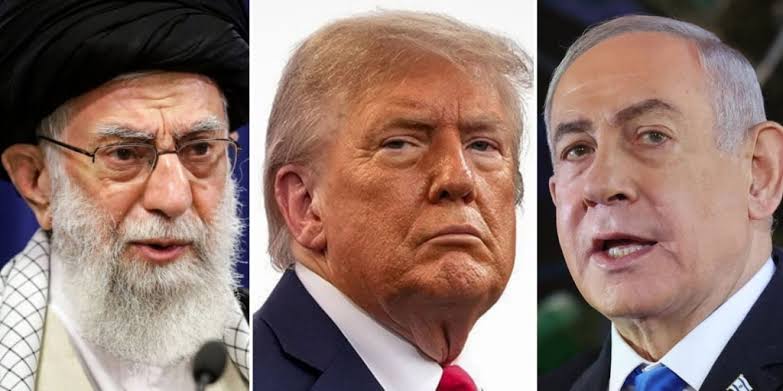
Things are getting even more heated as the Israel-Iran conflict continues to escalate, with more missles being shot from Iran towards Israel
According to United States President, the United States may be stepping in if things don’t de-escalate between both countries
Speaking in an interview with ABC News on Sunday, Trump emphasized that the U.S. is not currently involved in the conflict
but did not rule out the possibility of future intervention.

“We’re not involved in it. It’s possible we could get involved. But we are not at this moment involved,”
Trump said, referring to the rapidly intensifying military exchanges between the two longtime enemies.
Meanwhile, recall that Israel launched a preemptive strike on Iran on Friday,
targeting suspected nuclear and military assets, sparking the most recent violence.
Iran has also responded by launching waves of drone and missile strikes on Tel Aviv
and other major Israeli cities, causing days of chaos and devastation on both sides.

Trump predicted that the Iran-Israel conflict would eventually with them making a deal
to de-escalate the conflict, expressing hope that diplomacy could still win out in spite of the carnage.
Also Read:
“Tehran Will Burn” Israel Vows After Iran’s Reprisal Attacks!
Trump Advises Iran To Settle Or Face More Attacks From Israel!
Russia Threatens World War III After Trump Criticized Putin
Israel-Iran Conflict: Trump Suggests Putin Can Put An End To The Escalating War!
Moreover, in a surprising twist, Trump also suggested that Russian President Vladimir Putin could serve as a mediator
in the ongoing Israel-Iran conflict, citing Russia’s longstanding relationships with both Israel and Iran.
“He is ready. He called me about it. We had a long talk about it.
We talked about this more than his situation,” Trump said, referring to Putin’s war in Ukraine.
“This is something I believe is going to get resolved.”
However, Trump’s remarks were met with skepticism in Tehran. Iranian Foreign Minister Abbas Araghchi told reporters on Sunday that the Islamic Republic believes the U.S. is already complicit in Israel’s attacks.
“We have received messages from the U.S. through various channels over the past two days
stating that the U.S. had no involvement and will have no involvement in this attack,”
“As I said, we don’t believe the U.S.’s claim.”
Watch Live situation Report from the ongoing Israel-Iran conflict HERE
-

 Entertainment9 months ago
Entertainment9 months ago“I Made ₦10million In A Week During Covid”-Aisha Lawal
-

 Entertainment9 months ago
Entertainment9 months ago“I AM A PROUD YORUBA BOY!!!”-Mr Macaroni Slams APC Supporters
-

 Featured7 months ago
Featured7 months agoAir India Pilot Allegedly Crashed Plane Intentionally – Avaition Expert Claims
-

 Entertainment9 months ago
Entertainment9 months agoSeyi Law Slams Tunde Ednut for Alleged Harassment
-

 Featured9 months ago
Featured9 months agoResident Evil 9 Returns! See Official Release Date
-

 Entertainment8 months ago
Entertainment8 months agoOlamide And Asake Collaborates On New Track “99”: Feud Over?
-

 Entertainment9 months ago
Entertainment9 months agoAura For Aura: Iyano Ojo Drags Tanzania Media Personality, Mage Kimambi over Priscy And Jux’s Call Out!
-

 Entertainment8 months ago
Entertainment8 months ago“We Were Paid ₦10k Daily to Campaign For Tinubu”-Actor Lalude






































